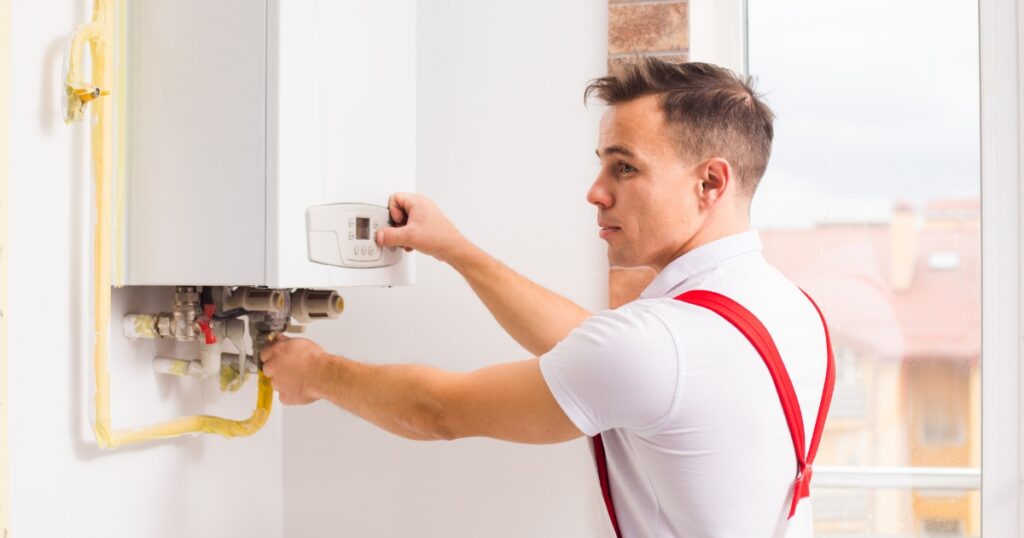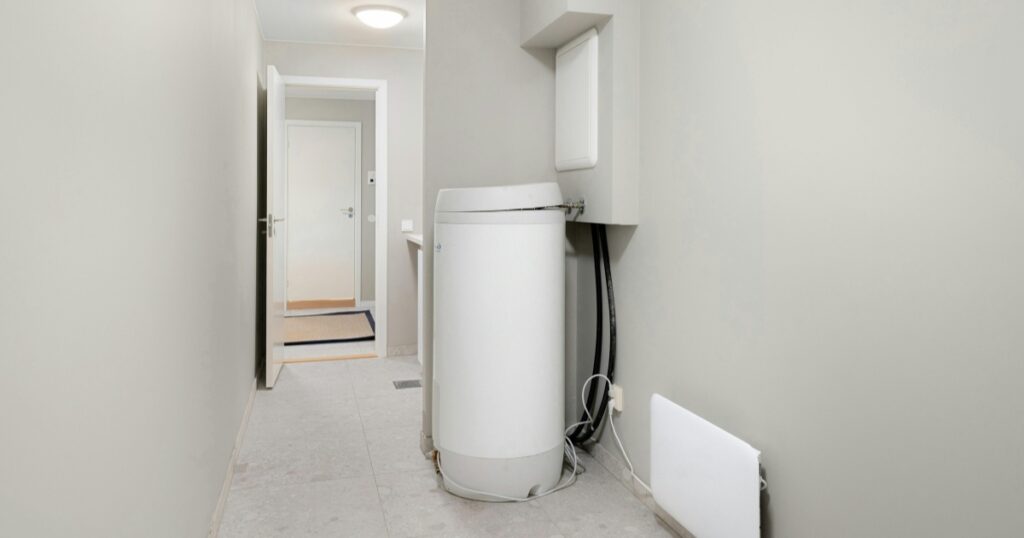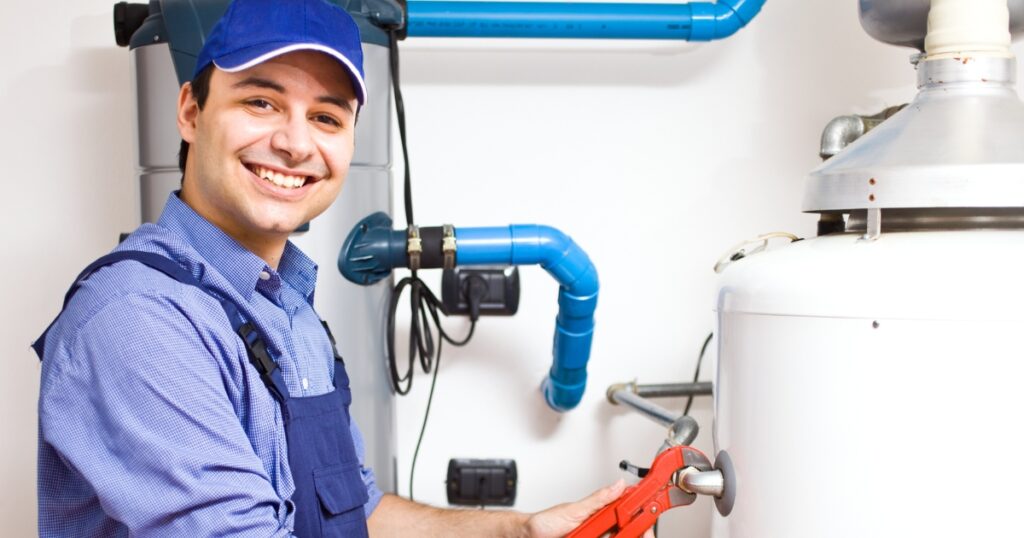Ah, there’s nothing quite like the jolt of a chilly shower to start your day off on the wrong foot or the sting of a sky-high energy bill landing in your mailbox out of the blue. We’ve all felt that frustration, and guess what? The pros reckon giving your hot water system a good once-over every six months can save you from these all-too-common hassles.
So, we’ve rolled up our sleeves and put together a ripper guide full of handy hints to keep your hot water ticking over nicely no matter what Mother Nature throws at us. Let’s get stuck into it and make sure those lukewarm showers are banished for good!
Key Takeaways
- Keep an eye on your hot water maintenance system’s temperature relief valve and check it every six months to avoid overheating and pressure issues.
- Drain the water heater at least twice a year to remove sediment that can make the unit work harder, leading to increased energy costs.
- Be cautious when gardening near your hot water system during summer; roots can damage pipes, causing leaks or cracks.
- Before winter hits, insulate your pipes and invest in a thermal cover for the hot water tank to cope with higher demand due to cold weather.
- If heading away from home for a long stretch, turn off your hot water system to save energy and prevent wear and tear.
Benefits of Regular Hot Water Maintenance
Regular hot water maintenance can save you money on energy bills, extend the lifespan of your hot water system, and prevent inconvenient breakdowns. It’s important to keep your hot water system in good working order to avoid costly repairs and ensure a reliable supply of hot water for your home.
Saves money on energy bills
We all love to keep a bit more cash in our pockets, and maintaining your hot water system can make that happen. By ensuring our systems are running efficiently, we avoid the sting of high energy bills.

Insulating your water heater is a smart move—doing so can cut heat loss by nearly half, which might just knock off up to 9% from those pesky heating costs.
Taking care of our hot water units also means flushing the tank every six months. This simple step helps get rid of sediment buildup that forces the system to work harder and use more energy.
And let’s not forget about replacing the anode rod when necessary; it’s key in preventing rust and keeping things running smoothly without unnecessary extra expenses on our energy bills.
Extends the lifespan of your hot water system
Regular maintenance is essential for prolonging the life of your hot water system. Keeping up with routine care can prevent costly breakdowns and ensure that your system operates efficiently for years to come.
By checking and replacing the anode rod, inspecting for leaks or rust, and flushing the heater tank, you can help maintain the integrity of your hot water unit.
Adding insulation to the water heater is also a simple way to reduce heat loss by up to 45 percent and cut down on energy costs. Proper maintenance not only extends the lifespan of your hot water system but also helps it handle increased demands during colder months.
Prevents inconvenient breakdowns
Regular hot water maintenance prevents inconvenient breakdowns. This upkeep ensures that your hot water system is running smoothly and efficiently, reducing the risk of sudden malfunctions or failures.
By addressing any potential issues proactively, you can avoid unexpected disruptions to your daily routine and ensure a constant supply of hot water when you need it most.
Hot water systems are like any other appliance – they require regular care to function optimally. Neglecting maintenance can lead to costly breakdowns and repairs down the line. By staying on top of scheduled maintenance tasks and inspections, you can minimise the chances of unexpected inconveniences caused by a malfunctioning hot water system.
DIY Hot Water Maintenance Tasks
Regular maintenance of your hot water system is essential for its longevity and efficiency. Simple tasks like checking the temperature relief valve, draining the water heater, and inspecting for cracks and leaks can be easily done at home.
This can save you money on repairs in the long run.
Check temperature relief valve every 6 months
Regularly checking the temperature relief valve on your hot water system is crucial to ensure it operates efficiently and safely. A faulty relief valve can lead to excessive pressure and potential overheating, posing a safety hazard in your home.
When inspecting the relief valve every six months, homeowners can prevent potential damage to their hot water system and safeguard against unexpected malfunctions.
Maintaining this simple task ensures that the relief valve functions correctly when needed, providing peace of mind for homeowners that their hot water system will continue running smoothly.
Drain the water heater regularly
After checking the temperature relief valve every 6 months, it’s essential to remember that draining your water heater regularly is crucial for maintaining efficient operation. Draining the water heater helps remove sediment and mineral buildup, which can affect its performance and lifespan.
It also ensures that your hot water system runs smoothly and efficiently, preventing potential breakdowns and costly repairs in the long run. This simple task should be done at least once every six months to keep your water heater functioning optimally.
Regularly drain the water heater to eliminate sediment buildup, ensuring it operates at its best capacity. By doing so, you can prevent potential breakdowns and extend the lifespan of your hot water system while saving money on energy bills in the process.
Inspect for cracks and leaks
When inspecting your hot water system, it’s essential to carefully check for any cracks or leaks. Even small cracks or leaks can lead to significant water damage and reduce the efficiency of your hot water unit.
Regularly examining the tank, pipes, and connections for any signs of damage is vital in preventing costly breakdowns and ensuring the longevity of your system.
Additionally, a professional plumber can also detect potential issues during routine inspections that may not be visible to an untrained eye. Identifying and addressing these problems early on can save you money on repairs in the long run while keeping your hot water system running smoothly.
Regular maintenance plays a crucial role in preventing unexpected disruptions and extending the lifespan of your appliance.
Turn off the system if away for extended periods
If we’re going away for an extended time, it’s crucial to turn off the hot water system. By doing this, we can prevent energy wastage and potential malfunctions while saving on utility bills in our absence.
Turning off the system also minimises wear and tear on the unit, extending its lifespan and reducing the need for repairs upon our return.
Moreover, an inactive water heater isn’t at risk of developing leaks or suffering from other defects that may go unnoticed during periods of non-use. This simple step is both cost-effective and ensures that our hot water system remains in optimal working condition when not required for extended periods.

Professional Hot Water Maintenance Services
“Yearly licensed plumber inspection can help identify any potential issues with your hot water system while scheduling regular maintenance can keep it running efficiently. It’s also important to be aware of signs that indicate the need for professional hot water repairs.
Yearly licensed plumber inspection
A yearly inspection by a licensed plumber is essential for ensuring your hot water system operates smoothly. This professional assessment can identify potential issues before they become major problems, saving you money on costly repairs down the road.
Additionally, regular maintenance can help extend the lifespan of your hot water system and ensure it continues to operate efficiently. It’s recommended to schedule this annual check-up twice a year before the cold weather starts or at any other convenient time.
Regular inspections also help maintain your hot water system’s warranty coverage and keep it running optimally for years to come. Don’t overlook the importance of scheduling this vital service from a qualified professional who understands the intricate workings of hot water systems.
Schedule for regular maintenance
Transitioning from the yearly licensed plumber inspection, it’s important to remember that regular maintenance is essential for keeping your hot water system running efficiently. Scheduling routine service and checks will help prevent unexpected breakdowns and ensure that your hot water system continues to operate at its best.
By adhering to a consistent maintenance schedule, you can extend the lifespan of your hot water unit and avoid costly repairs.
Scheduling regular professional maintenance every six months allows for thorough inspections, adjustments, and parts replacements as needed, ensuring that potential issues are addressed before they become major problems.
Be aware of signs for professional hot water repairs
Look out for signs such as rusty or discoloured water coming from your taps, strange noises emanating from the hot water system, or recurring issues with fluctuating water temperatures.
A sudden increase in your energy bills without a clear reason may also indicate that your hot water system requires professional attention. Additionally, if you notice any puddles or pools of water around the base of the hot water unit, it could be a sign of leaks and should prompt immediate assessment by a licensed plumber.
When overlooked, these signs can lead to more extensive damage and higher repair costs later on. If you notice any of these symptoms, it’s crucial to seek professional hot water repairs promptly to prevent further complications and ensure the longevity and efficiency of your hot water system.
Seasonal Hot Water Maintenance Tips
– In summer, be cautious with gardening around your hot water system to avoid damage or blockages.
– Prepare for colder temperatures in winter by insulating your pipes and investing in a thermal cover for your hot water tank.
Summer: Be cautious with gardening around the system
During summer, watch out for gardening activities near your hot water system. The plant’s roots can grow towards the pipes and cause damage by exerting pressure on them, leading to leaks or cracks in the system.

To prevent this, create a clear boundary between your garden and the hot water system. Use barriers such as rocks or mulch to keep plant growth at bay and maintain a safe distance from the unit.
Avoid planting large shrubs or trees too close to the system as their roots tend to spread wide and can interfere with underground piping. By remaining mindful of gardening around your hot water system during summer, you can protect it from potential damage and ensure its smooth functioning throughout the season.
Winter: Prepare for colder temperatures
As winter approaches, it’s crucial to prepare your hot water system for the colder temperatures. Ensuring that your heater is working efficiently during this time can help guarantee a steady supply of hot water when demand increases due to lower temperatures.
Adding insulation to the water tank and pipes can help reduce heat loss and subsequently cut down on energy costs, which tend to increase during the colder months. It’s also important to check for any leaks or cracks in the system, as these issues can worsen in cold weather and lead to a breakdown when you need hot water the most.
Properly maintaining our hot water systems over time helps prevent costly breakdowns and extends their lifespan. When preparing for winter, taking simple steps like adding insulation and checking for leaks can go a long way in ensuring that we have reliable access to hot water throughout the season.
Autumn/Spring: Give the system a proper clean
Autumn and spring are the ideal times to give your hot water system a thorough clean. Start by turning off the power and water supply to the heater. Then, drain the tank completely to remove sediment buildup, which can reduce its efficiency.
Next, check for any rust or corrosion on the tank and heating elements. Inspect pipes for leaks and ensure they’re properly sealed.
After cleaning, it’s crucial to inspect the sacrificial anode rod and replace it if necessary. This simple step helps prevent rust inside the tank, extending its lifespan. Additionally, consider wrapping insulation around exposed pipes near your hot water system to help conserve energy during cooler months.
Prompt Hot Water Services for Your Space’s Needs!
To sum up, seasonal hot water maintenance is crucial for saving money and avoiding inconvenient breakdowns. Regular DIY tasks like checking the relief valve and draining the water heater are essential.
Professional inspections by licensed plumbers ensure long-term efficiency. Always remember to prepare your system for changing weather conditions!
Ensure year-round comfort with our Seasonal Hot Water Maintenance Guide! At Hot Water Repairs Today, we believe in proactive care for your hot water systems. Discover exclusive tips and expert insights in our comprehensive Seasonal Hot Water Maintenance Guide to keep your system running seamlessly through every season. From winter warmth to summer serenity, we’ve got you covered! Don’t wait for surprises—take control of your hot water destiny. Connect with Hot Water Repairs Today and unlock the secrets to a consistently efficient hot water experience. Your comfort is our priority!






